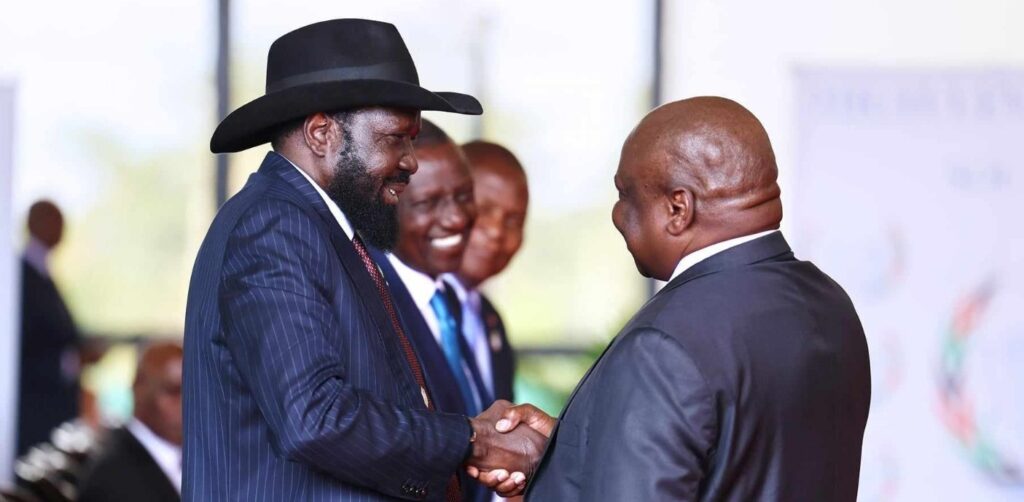South Sudan’s opposition has launched a scathing attack on the transitional government, alleging it intentionally killed the Nairobi-led Tumaini Peace Initiative, months after the process was quietly suspended.
This comes after Presidential Advisor and head of the government negotiators Gen. Kuol Manyang Juuk pronounced the Tumaini Peace Initiative dead and defunct, saying it had deviated from its original mandate and attempted to override the existing Revitalised Agreement on the Resolution of the Conflict in South Sudan (R-ARCSS), signed in 2018.
“The R-ARCSS has not been dissolved, so it cannot be replaced by the Tumaini,” Juuk told Eye Radio. “All that they have quoted is 80% of the chapters in the R-ARCSS incorporated into the Tumaini. It’s Tumaini 10 percent, which was not included in the R-ARCSS because you add the few to the majority, not the majority to the few.”
The Tumaini Initiative, backed by Kenya at the request of President Salva Kiir in December 2023, was meant to revive stalled peace negotiations by bringing new opposition groups, including the United People’s Alliance, into the fold. But Juba now accuses the process of legitimizing rebellion and undermining an already functional peace framework.
In an exclusive interview with Radio Tamazuj Tuesday, UPA Secretary-General Lual Dau accused Gen. Kuol of being handpicked by Kiir to sabotage the Tumaini Initiative, a process he said was designed to “rescue the country from collapse.”
“The statement made by Gen. Kuol Manyang did come as a surprise to us because he was brought to kill the Tumaini Initiative,” Dau asserted. “He did not kill Tumaini only, he also came and killed the R-ARCSS, and as a result of this, the first vice president has been under detained for a long period of time. So we can conclude that the 2018 peace agreement is dead and the Tumaini Initiative has now been killed.”
Dau, who also serves as spokesperson for the UPA, accused Kiir’s administration of systematically dismantling peace efforts, alleging the Tumaini Initiative’s collapse was a calculated move.
“The plan by President Kiir to kill Tumaini was just given to Gen. Kuol Manyang to execute, and he has succeeded in killing it,” he claimed.
Dau pointed out that opposition leaders had previously met with Kenyan President William Ruto and mediator Gen. Lazarus Sumbeiywo, where they were told the talks were “suspended temporarily” after Juba’s delegation requested time for further consultations and an extension of the transitional government in Juba in February 2025.
“For us at UPA, if the government has killed the Tumaini Initiative process, we don’t have other options to rescue it. But we will use the means at our disposal to bring about peace in South Sudan,” he said, without specifying what those means entail.
He dismissed government claims that opposition demands were excessive, insisting the real issue was systemic corruption and governance failures.
“The issue was not all about government jobs and accommodation. We wanted the country to address the root cause of the crisis—failure of leadership in nation-building,” Dau said. “There is no development, there is widespread corruption, there are no roads, there are issues of land grabbing. We say we need to address these problems, but the government refuses to discuss them. That is why the Tumaini Peace process has been killed.”
Dau underscored that initial progress was made under Amb. Albino Mathom Ayuel, the first head of Juba’s peace delegation, but negotiations faltered when Gen. Kuol took over. “We agreed on things such as the root cause of the crisis, but we did not discuss power-sharing,” he said.
When pressed on the opposition’s next steps, Dau ruled out returning to Kenyan mediation.
“We will not go back to President Ruto or anyone else. The peace initiative that has been declared dead was not ours—it was President Kiir who asked Kenya to mediate,” he said. “We will use all means at our disposal to change the current situation. The talks were just one part of our struggle.”
The Kenyan-led talks were adjourned indefinitely on February 7, 2025, without resolution.
The Tumaini Initiative, launched in Nairobi in May 2024, sought to integrate holdout groups that did not join the 2018 peace deal, including the Real-SPLM led by Pagan Amum, the South Sudan United Front led by former army chief Paul Malong Awan, the South Sudan People’s Movement/Army (SSPM/A) led by Gen. Stephen Buay Rolnyang, and the NAS-RCC led by Gen. Mario Laku Thomas.
Kenyan mediators have yet to issue an official statement on the apparent collapse of the Tumaini Initiative talks.




